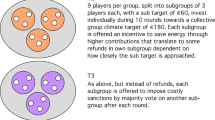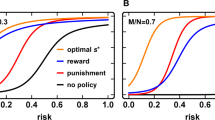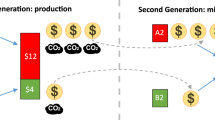Abstract
A characteristic feature of the global climate change dilemma is interdependence between the underlying economic development that drives anthropogenic climate change—typically modelled as a common pool resource dilemma1,2—and the subsequent dilemma arising from the need to mitigate the negative effects of climate change, often modelled as a public goods dilemma3,4. In other words, in a carbon-based economy, causal responsibility for climate change is a byproduct of economic development, and is therefore endogenous to it. To capture this endogeneity, we combine these two dilemmas into a ‘compound climate dilemma’ and conduct a series of incentivized experiments in the United States and China to test its implications for cooperation and prosocial behaviour. Here we show that, in a differentiated development condition, even while the advantaged parties increase their prosociality relative to an endogenous but homogeneous baseline condition, the accompanying decrease in cooperative behaviour by the disadvantaged parties more than offsets it. Furthermore, compared with exogenous but identically parameterized control conditions, this endogeneity decreases cooperation in the mitigation dilemma. In light of this interdependence, the basis upon which mitigation obligations should be differentiated becomes an additional dimension of conflict, with implications for domestic politics and international negotiations discussed5,6.
This is a preview of subscription content, access via your institution
Access options
Access Nature and 54 other Nature Portfolio journals
Get Nature+, our best-value online-access subscription
$29.99 / 30 days
cancel any time
Subscribe to this journal
Receive 12 digital issues and online access to articles
$119.00 per year
only $9.92 per issue
Buy this article
- Purchase on Springer Link
- Instant access to full article PDF
Prices may be subject to local taxes which are calculated during checkout




Similar content being viewed by others
References
Ostrom, E. E. et al. The Drama of the Commons (National Academies Press, Washington DC, 2002).
Dietz, T., Ostrom, E. & Stern, P. C. The struggle to govern the commons. Science 302, 1907–1912 (2003).
Milinski, M., Sommerfeld, R. D., Krambeck, H.-J., Reed, F. A. & Marotzke, J. The collective-risk social dilemma and the prevention of simulated dangerous climate change. Proc. Natl Acad. Sci. USA 105, 2291–2294 (2008).
Barrett, S. & Dannenberg, A. Climate negotiations under scientific uncertainty. Proc. Natl Acad. Sci. USA 109, 17372–17376 (2012).
Hsu, A., Moffat, A. S., Weinfurter, A. J. & Schwartz, J. D. Towards a new climate diplomacy. Nat. Clim. Change 5, 501–503 (2015).
Keohane, R. O. & Oppenheimer, M. Paris: beyond the climate dead end through pledge and review? Politics Gov. 4, 142–151 (2016).
Rogelj, J. et al. Paris Agreement climate proposals need a boost to keep warming well below 2 °C. Nature 534, 631–639 (2016).
Gardiner, S. M. A perfect moral storm: climate change, intergenerational ethics and the problem of moral corruption. Environ. Values 15, 397–413 (2006).
Wagner, G. & Weitzman, M. L. Climate Shock: The Economic Consequences of a Hotter Planet (Princeton Univ. Press, Princeton, NJ, 2016).
Den Elzen, M. & Schaeffer, M. Responsibility for past and future global warming: uncertainties in attributing anthropogenic climate change. Climatic Change 54, 29–73 (2002).
Baer, P. et al. Equity and greenhouse gas responsibility. Science 289, 2287 (2000).
Caney, S. Cosmopolitan justice, responsibility, and global climate change. Leiden J. Int. Law 18, 747–775 (2005).
Tavoni, A., Dannenberg, A., Kallis, G. & Löschel, A. Inequality, communication, and the avoidance of disastrous climate change in a public goods game. Proc. Natl Acad. Sci. USA 108, 11825–11829 (2011).
Schüssler, R. Climate justice: a question of historic responsibility? J. Glob. Ethics 7, 261–278 (2011).
Peters, G. P., Minx, J. C., Weber, C. L. & Edenhofer, O. Growth in emission transfers via international trade from 1990 to 2008. Proc. Natl Acad. Sci. USA 108, 8903–8908 (2011).
Deleuil, T. The common but differentiated responsibilities principle: changes in continuity after the Durban conference of the parties. Rev. Eur. Comp. Int. Environ. Law 21, 271–281 (2012).
Nordhaus, W. D. & Boyer, J. G. Requiem for Kyoto: an economic analysis of the Kyoto protocol. Energy J. 20, 93–130 (1999).
Report of the United Nations Conference on Environment and Development, Rio de Janeiro Technical Report No. A/CONF.151/26/Annex.1 (UNCED, 1992).
Broome, J. The ethics of climate change. Sci. Am. 298, 96–102 (2008).
Jacquet, J. et al. Intra-and intergenerational discounting in the climate game. Nat. Clim. Change 3, 1025–1028 (2013).
Hauser, O. P., Rand, D. G., Peysakhovich, A. & Nowak, M. A. Cooperating with the future. Nature 511, 220–223 (2014).
Shue, H. Global environment and international inequality. Int. Aff. 75, 531–545 (1999).
Bernard, M., Dreber, A., Strimling, P. & Eriksson, K. The subgroup problem: when can binding voting on extractions from a common pool resource overcome the tragedy of the commons? J. Econ. Behav. Organ. 91, 122–130 (2013).
Fennewald, T. J. & Kievit-Kylar, B. Integrating climate change mechanics into a common pool resource game. Simul. Gaming 44, 427–451 (2013).
Srinivasan, U. T. et al. The debt of nations and the distribution of ecological impacts from human activities. Proc. Natl Acad. Sci. USA 105, 1768–1773 (2008).
The Cost of Delaying Action to Stem Climate Change (The White House Council of Economic Advisers, 2014).
Heitzig, J., Lessmann, K. & Zou, Y. Self-enforcing strategies to deter free-riding in the climate change mitigation game and other repeated public good games. Proc. Natl Acad. Sci. USA 108, 15739–15744 (2011).
Kesternich, M., Lange, A. & Sturm, B. The impact of burden sharing rules on the voluntary provision of public goods. J. Econ. Behav. Organ. 105, 107–123 (2014).
Milinski, M., Röhl, T. & Marotzke, J. Cooperative interaction of rich and poor can be catalyzed by intermediate climate targets. Climatic Change 109, 807–814 (2011).
Del Ponte, A., Delton, A. W., Kline, R. & Seltzer, N. A. Passing it along: experiments on creating the negative externalities of climate change. J. Polit. 79, 1444–1448 (2017).
Clark, J. House money effects in public good experiments. Exp. Econ. 5, 223–231 (2002).
Harrison, G. W. House money effects in public good experiments: comment. Exp. Econ. 10, 429–437 (2007).
Spraggon, J. & Oxoby, R. J. An experimental investigation of endowment source heterogeneity in two-person public good games. Econ. Lett. 104, 102–105 (2009).
Kroll, S., Cherry, T. L. & Shogren, J. F. The impact of endowment heterogeneity and origin on contributions in best-shot public good games. Exp. Econ. 10, 411–428 (2007).
Gampfer, R. Do individuals care about fairness in burden sharing for climate change mitigation? Evidence from a lab experiment. Climatic Change 124, 65–77 (2014).
Anderson, B., Bernauer, T. & Balietti, S. Effects of fairness principles on willingness to pay for climate change mitigation. Climatic Change 142, 447–461 (2017).
Hansen, J. et al. Target atmospheric CO2: where should humanity aim? Open Atmos. Sci. J. 2, 217–231 (2008).
Wang, J., Fu, F. & Wang, L. Effects of heterogeneous wealth distribution on public cooperation with collective risk. Phys. Rev. E 82, 016102 (2010).
Burton-Chellew, M. N., May, R. M. & West, S. A. Combined inequality in wealth and risk leads to disaster in the climate change game. Climatic Change 120, 815–830 (2013).
Chakra, M. A. & Traulsen, A. Under high stakes and uncertainty the rich should lend the poor a helping hand. J. Theor. Biol. 341, 123–130 (2014).
Vasconcelos, V. V., Santos, F. C., Pacheco, J. M. & Levin, S. A. Climate policies under wealth inequality. Proc. Natl Acad. Sci. USA 111, 2212–2216 (2014).
Keohane, R. Keohane on climate: what price equity and justice? Climate Change News http://www.climatechangenews.com/2016/09/06/keohane-on-climate-what-price-equity-and-justice/ (2016).
Klinsky, S. et al. Why equity is fundamental in climate change policy research. Glob. Environ. Change 44, 170–173 (2017).
Fischbacher, U. z-tree: Zurich toolbox for ready-made economic experiments. Exp. Econ. 10, 171–178 (2007).
Kline, R. Replication Data for: Differentiated Responsibilities and Prosocial Behavior in Climate Change Mitigation (Harvard Dataverse, 2018); https://doi.org/10.7910/DVN/CBFAON
Acknowledgements
We thank many seminar participants; K. Ou, G. Yan and X. Qin for invaluable assistance in carrying out the experiments in Shanghai; and Y. Li for translating the stimuli into Chinese. This research was supported by the Stony Brook University College of Arts and Science Dean's Fund for Excellence. The funders had no role in the study design, the data collection and analysis, the decision to publish or the preparation of the manuscript.
Author information
Authors and Affiliations
Contributions
R.K. wrote the manuscript. R.K. and N.S. analysed the data. E.L. programmed the studies. A.B., E.L., R.K. and N.S. designed the studies and discussed the results..
Corresponding author
Ethics declarations
Competing interests
The authors declare no competing interests.
Additional information
Publisher’s note: Springer Nature remains neutral with regard to jurisdictional claims in published maps and institutional affiliations.
Supplementary information
Supplementary Information
Supplementary Discussion, Supplementary Note, Supplementary Tables 1–9, Supplementary Figures 1–4, Supplementary Methods, Supplementary References 1–16.
Rights and permissions
About this article
Cite this article
Kline, R., Seltzer, N., Lukinova, E. et al. Differentiated responsibilities and prosocial behaviour in climate change mitigation. Nat Hum Behav 2, 653–661 (2018). https://doi.org/10.1038/s41562-018-0418-0
Received:
Accepted:
Published:
Issue Date:
DOI: https://doi.org/10.1038/s41562-018-0418-0
This article is cited by
-
Information about historical emissions drives the division of climate change mitigation costs
Nature Communications (2023)
-
The case for the “climate humanities”: toward a transdisciplinary, equity-focused paradigm shift within climate scholarship
Sustainability Science (2023)
-
Is Climate Change Induced by Humans? The Impact of the Gap in Perceptions on Cooperation
Economics of Disasters and Climate Change (2021)
-
Where mitigation and migration meet
Nature Climate Change (2020)
-
Dialling down the temperature
Nature Human Behaviour (2018)



